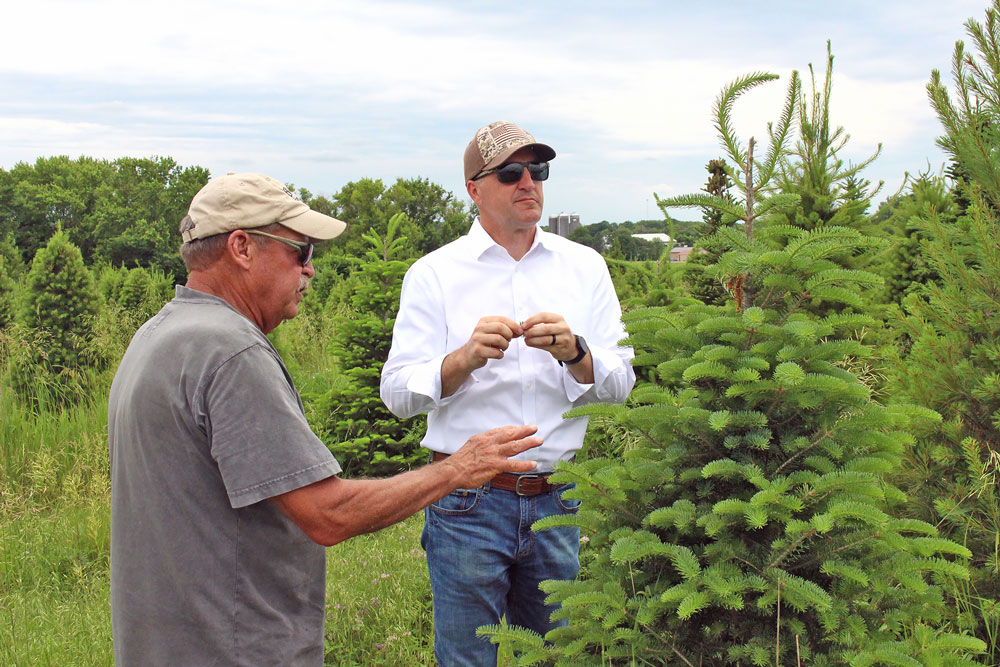Reynolds vetoes eminent domain/pipeline bill

By Bob Steenson, bsteenson@charlescitypress.com
Gov. Kim Reynolds on Wednesday vetoed a bill that would have placed new limits on the use of eminent domain for projects like the proposed Summit Carbon Solutions pipeline that would cut across Floyd County, including through the Avenue of the Saints Development Park in Charles City.
Reynolds’ veto of House File 639 drew immediate reactions from both sides of the highly charged issue, which has sparked legal and political battles statewide over the past three years.
Supporters of the legislation argued it is needed to protect Iowa landowners from having private property taken for a project they say primarily benefits private investors.
Opponents warned the measure could cripple future infrastructure projects critical to agriculture, ethanol and energy production.

Rep. Charley Thomson, R-Charles City, who had written the bill, issued a statement saying the governor’s actions put her “solidly on board” with “a ruthless cabal of politicians intent on a reckless, unsafe, and illegal pipeline project.”
“In the governor’s view, constitutional rights, such as eminent domain protections, should not be allowed to interfere with schemes to make money, especially if those schemes are being promoted by her friends, supporters, and contributors,” Thomson said.
In her veto message, Reynolds said that while she respects both sides of the debate, House File 639 “isn’t just about eminent domain.”
“It goes much further – and in doing so, sets a troubling precedent that threatens Iowa’s energy reliability, economy and reputation as a place where businesses can invest with confidence,” she wrote.
Reynolds said the bill would change permitting rules and inject uncertainty into critical energy projects including oil, gas and fertilizer pipelines.
Even carbon dioxide pipeline projects that rely entirely on voluntary easements would be harmed, she wrote, including a planned project by Southwest Iowa Renewable Energy that has not used eminent domain.

She said new insurance mandates and a 25-year operating limit included in HF 639 “would effectively kill the project – despite the millions that have already been spent on its development.”
For those reasons, Reynolds said, she could not sign the bill.
The governor said she would enact two requirements that the bill had contained, giving an order to the Iowa Utilities Commission that all three commissioners must be present for hearings regarding proposed pipelines, utility regulations or electric transmission lines, and at least one commission must attend informational meetings that are required to be held along a project’s route.
Iowa House Speaker Pat Grassley, R-New Hartford, sharply criticized the governor’s veto decision and said House Republicans would begin efforts to petition for a legislative special session to override the veto.
“We will not stop fighting and stand firm on our commitment until landowners in Iowa are protected against eminent domain for private gain,” Grassley said.
Thomson, of Charles City, said, “I am proud to join with my colleagues in the House in calling for a special session of the General Assembly to override today’s veto. I am also looking forward to working with my colleagues in the General Assembly to restore Iowans’ Constitutional rights, to reform Iowa’s corrupt utilities regulation system, and to investigate the circumstances surrounding all aspects of Summit scandal.”
Although it is typically the governor who calls a special session of the General Assembly, as Reynolds did in 2023 regarding an abortion bill, Iowa Code allows for legislators to call a special session, but sets a high bar – two-thirds of the members in each chamber must submit a written request to their presiding officers.
That’s the same super majority it would take to override the veto.
Reaction to Reynolds’ decision came quickly and along predictable lines.
Summit Carbon Solutions praised the veto, saying the governor and her staff had conducted a “thoughtful and thorough review” of the legislation. The company said it remains committed to working with landowners.
Industry groups that lobbied for the veto also applauded Reynolds’ action.
The American Carbon Alliance called the veto “a clear victory for Iowa’s agricultural heartland, farmers, and the ethanol industry,” accusing environmental groups of trying to derail the pipeline to serve an “anti-ag, anti-ethanol and anti-energy agenda.”
The Iowa Renewable Fuels Association warned that the legislation would have “slammed the door on major new ag markets at the exact time farmers are hurting.”
Coming from the other side, the Libertarian Party of Iowa called the governor’s decision “an unconscionable betrayal that will allow corporations to steal Iowa family farms through government force.”
Iowa CCI Action Board President Cherie Mortice said her organization was “extremely disappointed, but sadly not surprised, by Governor Reynolds’ decision,” and that it “shows the undue influence that private interests and corporations have at our statehouse – in this case, the interests of a major political donor, Bruce Rastetter,” who is founder and executive chairman of Summit Agricultural Group.
Floyd County supervisors have long opposed the use of eminent domain for the project and are participating in a legal challenge along with eight other counties, contending that Summit should not qualify for eminent domain authority under Iowa law.
Floyd County’s legal action is one of several lawsuits filed by landowners, environmental groups and state legislators led by Thomson.
Thomson and other lawmakers argue the Iowa Utilities Commission overstepped its authority when it approved Summit’s request to use eminent domain, saying the project is not a true public utility but rather a private investment venture backed by federal tax credits.
In addition to concerns over property rights, Floyd County residents and officials have raised safety questions, noting the pipeline’s proximity to populated areas. Critics have cited a 2020 carbon pipeline rupture in Mississippi as evidence of the potential risk.
Reynolds referred to that often-cited incident in Satartia, Mississippi, in a letter she sent to the Department of Transportation’s Pipeline and Hazardous Materials Safety Administration, asking about pipeline safety. A copy of PHMSA’s response was included with Reynold’s veto statement in a press release.
PHMSA responded that the Satartia incident – which resulted in a single hospitalization – was caused by an unusual combination of weather, environmental conditions and regulations violations that PHMSA addressed in an advisory bulletin.
“CO2 pipelines have an overall robust safety track record,” PHMSA Acting Administrator Ben Kochman wrote to Reynolds. “Over the last five years, CO2 pipelines have had an average reportable accident per thousand-mile rate of 0.88, lower than the general hazardous liquid pipeline reportable accident rate of 1.46.”
The Iowa Utilities Commission has approved Summit’s permit request but imposed several conditions that must be met before construction can begin, including regulatory approval in North Dakota and South Dakota.
South Dakota has passed a law effectively prohibiting the use of eminent domain on the proposed Summit pipeline in that state.
Statement by Rep. Charley Thomson, R-Charles City
Issued Wednesday, June 11:
Today is a dark day for Iowa’s citizens and their rights under the Iowa and United States Constitutions. Today, Iowa’s chief executive was faced with a choice between supporting legitimate private property rights and supporting a ruthless cabal of politicians intent on a reckless, unsafe, and illegal pipeline project. We now know that Governor Reynolds is solidly on board with Team Cabal.
Further, Iowans should not take heart from the soft, purring words in today’s veto message. The excuses trotted out about “insurance” concerns are just polite window-dressing for the real message: She will oppose and veto any bill that Summit Carbon Solutions dislikes, and if that means trashing the rights of every landowner in the state, that’s just too bad. In the Governor’s view, constitutional rights, such as eminent domain protections, should not be allowed to interfere with schemes to make money, especially if those schemes are being promoted by her friends, supporters, and contributors. The Constitution doesn’t matter, the safety risks to the public do not matter, and the weight of public opinion does not matter. The long-term economic interests of Iowans doesn’t even count in this equation, since this devil-may-care approach to property rights protections will make people less interested in holding and improving Iowa real property. For example, who in their right mind would consider putting in pattern tiling if politically connected developers can just seize the land with practically no due process or compensation?
I am proud to join with my colleagues in the House in calling for a Special Session of the General Assembly to override today’s veto. I am also looking forward to working with my colleagues in the General Assembly to restore Iowans’ Constitutional rights, to reform Iowa’s corrupt utilities regulation system, and to investigate the circumstances surrounding all aspects of Summit scandal. I am also looking forward to helping the general public understand that the approach of “the cabal” to property rights protections does not represent the views of the vast majority of Republicans or Republican office holders. The Rockefeller-Romney-McCain anything-for-a-buck “wing” of the party is tiny, albeit very loud.
Finally, I would like to correct the record on one point. In her veto message, the Governor made reference to the “intent” of the legislation. I find this interesting, since I drafted the bill, and neither the Governor nor any member of her staff contacted me about any provision of HF 639.









Social Share